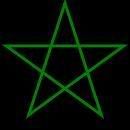.png) |
| The old historical flag of Bohemia (white over red bars), along with its historical arms (white lion on red background), would make a perfect modern national flag |
Why not... "Bohemia" ...?
Bohemia
Bohemia (Czech: Čechy; German: Böhmen; Polish: Czechy; French: Bohême; Latin: Bohemia) is a region in the Czech Republic. In a broader meaning, it often refers to the entire Czech territory, including Moravia and Czech Silesia, especially in historical contexts: the lands of the Bohemian Crown. Bohemia was a kingdom in the Holy Roman Empire and subsequently a province in the Habsburgs’ Austrian Empire. It was bounded on the south by Upper and Lower Austria, on the west by Bavaria, on the north by Saxony and Lusatia, on the northeast by Silesia, and on the east by Moravia. From 1918 to 1939 and from 1945 to 1992 it was part of Czechoslovakia; and, since 1993, it has formed much of the Czech Republic.
Etymology
In the 2nd century BC, the Romans were competing for dominance in northern Italy, with various peoples including the Boii. The Romans defeated the Boii at the Battle of Placentia (194 BC) and the Battle of Mutina (193 BC). After this, many of the Boii retreated north across the Alps.[4]
Much later Roman authors refer to the area they had once occupied as Boiohaemum, the earliest mention being in Tacitus' Germania 28 (written at the end of the 1st century AD). The name appears to include the tribal name Boi- plus the Germanic element *haimaz "home" (whence Gothic haims, German Heim, English home). This Boiohaemum included parts of southern Bohemia as well as parts of Bavaria (whose name also seems to derive from the tribal name Boii) and Austria. The Czech name "Čechy" is derived from the name of the Slavic tribe of Czechs who settled in the area during the 6th or 7th century AD.
 Ancient Bohemia
Ancient BohemiaBohemia, like neighbouring Bavaria, is named after the Boii, who were a large Celtic nation known to the Romans for their migrations and settlement in northern Italy and other places. Another part of the nation moved west with the Helvetii into southern France, which was one of the events leading to the interventions of Julius Caesar's Gaulish campaign of 58 BC. The emigration of the Helvetii and Boii left southern Germany and Bohemia a lightly inhabited "desert" into which Suebic peoples arrived, speaking Germanic languages, and became dominant over remaining Celtic groups. Both Tacitus and Strabo refer to an area as Boiohaemum named after the Boii. The second component of this name is a Germanic word, related to modern German heim, and English "home", so the term means "Boii-home". To the south, over the Danube, the Romans extended their empire, and to the southeast in Hungaria, were Sarmatian peoples.
Kingdom of Bohemia
************
The concept, style, history, and symbolism of a nation of "Bohemia" appears to me to be much stronger than the current Czech Republic. I can't really determine any good reason that the name was changed in the first place. The modern Bohemia makes up most of today's Czech Republic. Names of nations is no exact science. France is named after the Teutonic tribe the Franks, even though the Frankish period was only a smaller part of the history of the region. The entire north of the Italian peninsula could have been named "Lombardia" due to the geographically-unifying period of Langobard rule; although that tribe was only a part of the region's history. Immigrants from old waves of immigration from specifically Bohemia were referred to--and referred to themselves--as "Bohemians." Old kings and warlords jumbled its borders, which didn't help matters any.
 Underrated actor
Underrated actorI watched the 2006 film 'The Hoax' the other evening, and it's clear to me that Alfred Molina is one very underrated actor. Whatever the character role requires, he fits it like a glove. In this movie his character was vulnerable, and he was exactly that. Often with even the better actors, transitions appear somewhat contrived. Molina is much better than, for example, Alec Baldwin who has earned enormous sums for merely playing himself in each role.
Synchronicity, synchronicity..
Yesterday I was working on a new Vehmic symbol, with a four-part shield and a black rose in front of it. I was deep in thought, and this is usually due to my desire to make symbols, colors, and arrangement totally congruent. I decided to take a break, and walked into the living room. As I looked out the large window, I saw four little birds on the telephone wire, and I pondered that they could represent the four sections of the arms, and I amusingly dismissed it on the spot. As I then continued to walk towards the window, I saw a fifth little bird which was initially obstructed.
4 + 1 = 5
4 birds at an approximately six inch equal distance from one another (the symbolic 4-part quadratic shield) + 1 bird approximately one foot from the others (the symbolic detached black rose) = 5 (the sum of the Vehme).
The only problem with synchronicity is that you cannot truly prove it. You may only prove it to yourself, which is it's universal law. It ultimately only applies to you, and it's only message is that you're on the correct path. Even brilliant minds which have tapped into this universal symbolism, which is available to anyone, erroneously have assumed that it made them special. It does not make anyone special. It's only an acknowledgement by the universal consciousness.
'Horned Nephilim Skeletons Found In Valley Of Giants?'
BeforeItsNews.com - January 10, 2013
Several human skulls with horns protruding from them were discovered in a burial mound at Sayre, Bradford County, Pennsylvania, in the 1880′s. With the exception of the bony projections located about two inches above the eyebrows, the men whom these skeletons belonged to were anatomically normal, although at seven feet tall they were considered to be giants. Burial was believed to have been in the neighborhood of 1200 AD.
con'd
************
I don't like to cover general mysteries here unless it's linked to a related subject. However, I have always found the horned skulls to be particularly strange.
"Love a rainy night" - perfect during current Californa storm
This one by Eddie Rabbit never gets old.
Eddie Rabbitt - I Love A Rainy Night
Allec Joshua Ibay
Tribute to the late Eddie Rabbitt
.



No comments:
Post a Comment